What if you got a new toy but couldn’t play with it? Imagine if your computer wanted a new game, but it couldn’t play because of its parts. This is what happens with Windows 11 on some computers. Have you ever seen someone buy new parts to fix an old bike? It’s the same with computers when they want to update to Windows 11. Now, you may wonder, why do some computers need new parts just for this update? Well, Windows 11, a new version of Windows, requires certain computer parts to work. It’s like asking for a special key to open a new treasure chest, and many people find this both exciting and a bit puzzling. So, what makes Windows 11 so special? Let’s dive in and uncover what makes this update a unique adventure for our computers.
Understanding The System Requirements For Windows 11
Windows 11, Microsoft’S Latest Operating System, Brings A Fresh Design And Improved Features Aimed At Enhancing User Experience. However, Before Upgrading Or Installing, It’S Essential To Understand The System Requirements For Windows 11 To Ensure Your Device Can Support The New Os. Microsoft Has Set Specific Hardware Requirements That Mark A Significant Change From Previous Versions. This Article Will Explore These Specifications And Guide You In Determining If Your Pc Is Ready For Windows 11.
Minimum System Requirements
1. **Processor**: A Compatible 64-Bit Processor With At Least Two Cores And A Clock Speed Of 1 Ghz Or Faster.
2. **Ram**: A Minimum Of 4Gb Is Necessary For Efficient Performance.
3. **Storage**: At Least 64Gb Of Available Storage Is Required For Installation And Updates.
4. **System Firmware**: Uefi, Secure Boot Capable.
5. **Tpm**: Trusted Platform Module (Tpm) Version 2.0.
6. **Graphics Card**: Directx 12 Compatible Graphics With A Wddm 2.0 Driver.
7. **Display**: At Least A 9-Inch Display With An Hd Resolution Of 720P.
8. **Internet Connection**: Necessary For Initial Setup And Updates.
Additional Requirements And Features
Certain Features In Windows 11 Have Additional Requirements:
– **Windows Hello**: Requires A Camera Configured For Near-Infrared (Ir) Imaging Or A Fingerprint Reader For Biometric Authentication.
– **Cortana**: For Use, A Microphone And Speaker Are Required.
– **Snap Layouts And Snap Groups**: These Functionalities Benefit From A Larger Display With High Resolution.
– **Directstorage**: Needs An Nvme Ssd To Improve Gaming Performance.
Compatibility Check
Microsoft Provides A Pc Health Check App To Assess Whether Your Device Meets The Requirements For Windows 11. This Tool Quickly Analyzes Your System, Highlighting Any Components That Do Not Meet The Necessary Criteria.
Why These Requirements?
The Raised Hardware Standards Are Intended To Boost Security, Reliability, And Compatibility. Features Like Tpm 2.0 Play A Critical Role In Enhancing Protection Against Modern Security Threats, While Secure Boot Ensures Only Trusted Software Is Loaded During Startup.
Conclusion
Understanding The System Requirements For Windows 11 Is Crucial For A Smooth Transition. Ensuring Your Device Meets These Specifications Will Maximize The Benefits Of The Latest Features And Security Enhancements. If Your Current Setup Doesn’T Align With These Standards, It Might Be Time To Consider Upgrading Your Hardware Or Exploring Other Options To Stay Current With Microsoft’S Latest Offerings.
Requirement for Windows 11
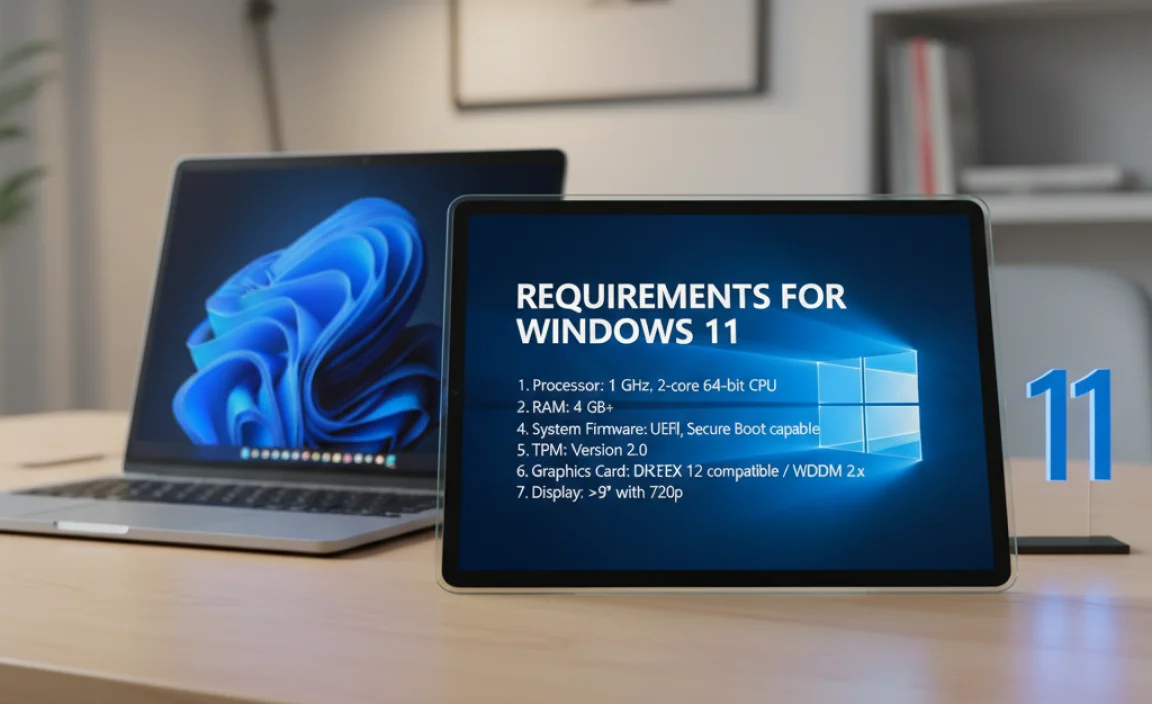
Ever tried keeping a secret? Well, Windows 11 had one! Microsoft revealed this gem with big changes. What’s needed to join the fun? Your PC needs a 1GHz processor and at least 4GB RAM. A secure chip called TPM 2.0 is a must-have, like a security badge. Oh, and get ready for a 64GB storage hug. Does your PC make the cut? Time to check and maybe unlock a new world!
Minimum Hardware Requirements for Windows 11
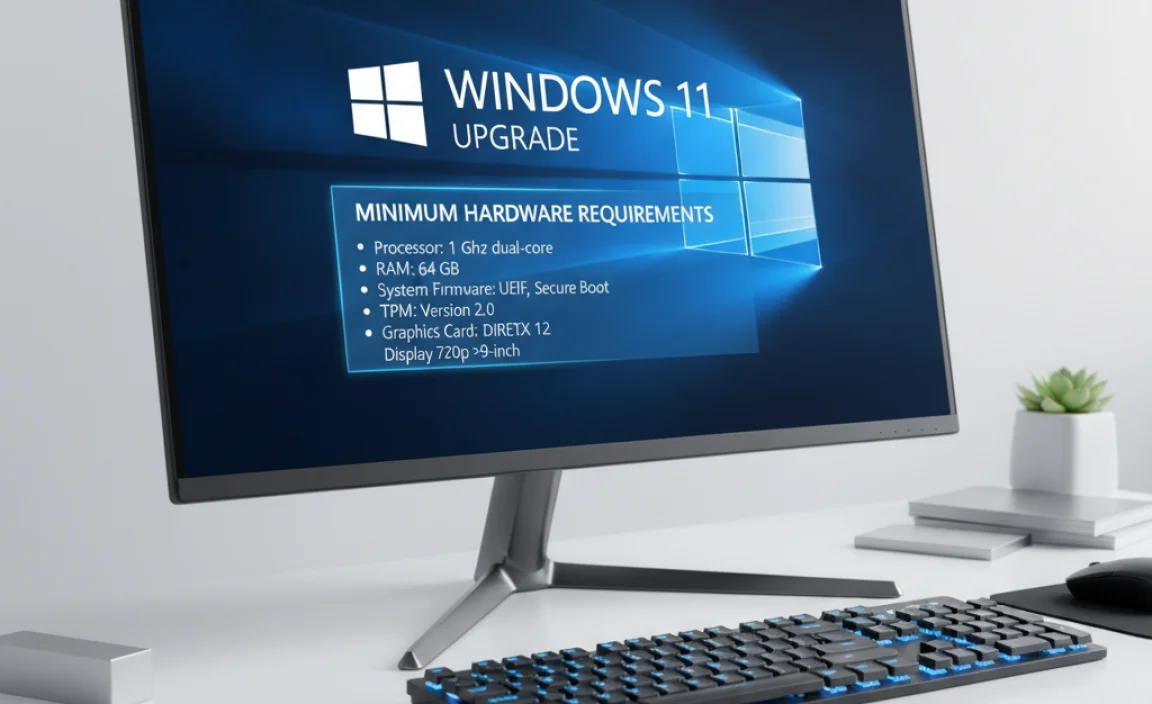
Details on CPU specifications and compatible models. RAM and storage capacity essentials. Graphics card requirements and DirectX version.
Thinking about diving into Windows 11? Let’s see if your PC is ready. Your processor, or CPU, must be pretty smart to make the cut. You need at least a 1 GHz clock speed with two cores. No single-core CPUs here!
Next up is **RAM**, which acts like your computer’s short-term memory. At least 4 GB is required, but more always helps your computer remember things faster. Now, hop into storage. Do you have at least 64 GB of available space? That’s a must-have for Windows 11.
Checking out the graphics card would be your next step. Your GPU should support DirectX 12 or have a compatible WDDM 2.0 driver. Don’t worry, you don’t need a super-duper gaming card; a basic one will do the trick.
So, is your computer ready to party with Windows 11? If one piece is missing, it might be time to consider an upgrade!
Windows 11 Compatible Devices and Upgrade Eligibility
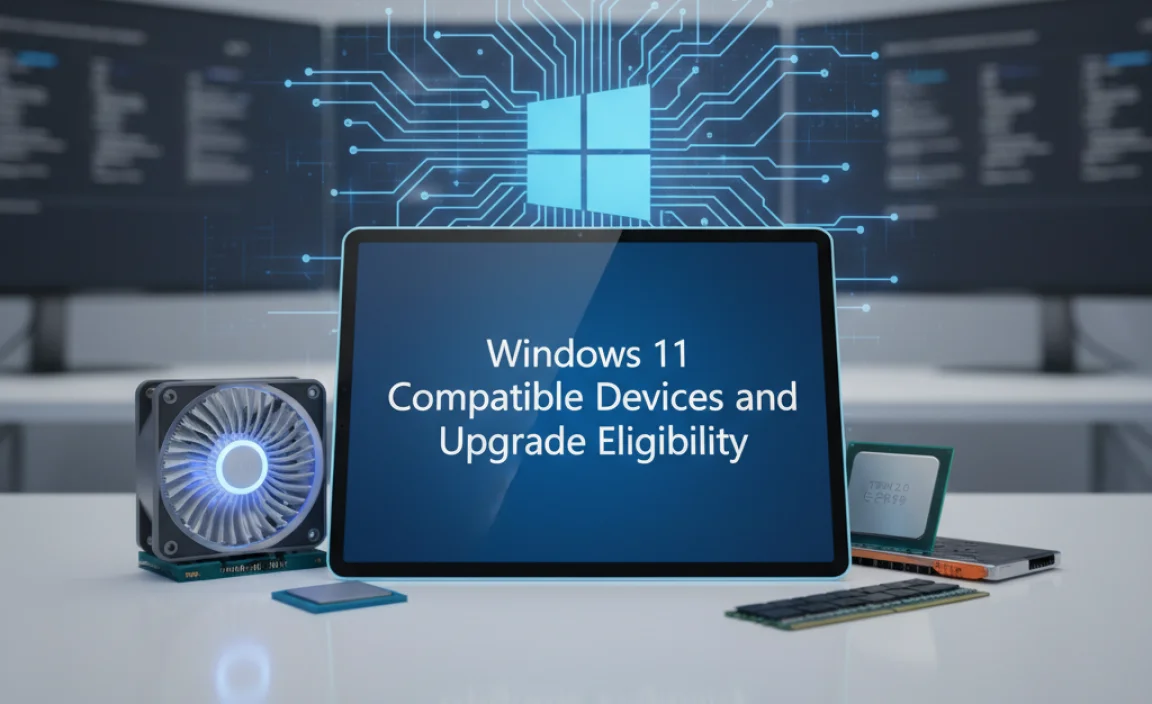
Supported PC models and manufacturers. How to check device compatibility. Upgrade options for existing Windows users.
If you want to see if your PC can run Windows 11, there are a few things to check. Many new computers from known brands like Dell, HP, and Lenovo support it. But how do you check compatibility? Use the PC Health Check app. It tells you if your device is ready for an upgrade. Already using Windows 10? You might see a free upgrade option in your updates.
How do I know if my device is compatible with Windows 11?
To discover if your device is compatible with Windows 11, use Microsoft’s PC Health Check tool. It quickly checks your system’s specs and tells you if you can upgrade. If your device fails the test, it means it’s not yet ready for upgraded features.
TPM 2.0 and Security Requirements for Windows 11
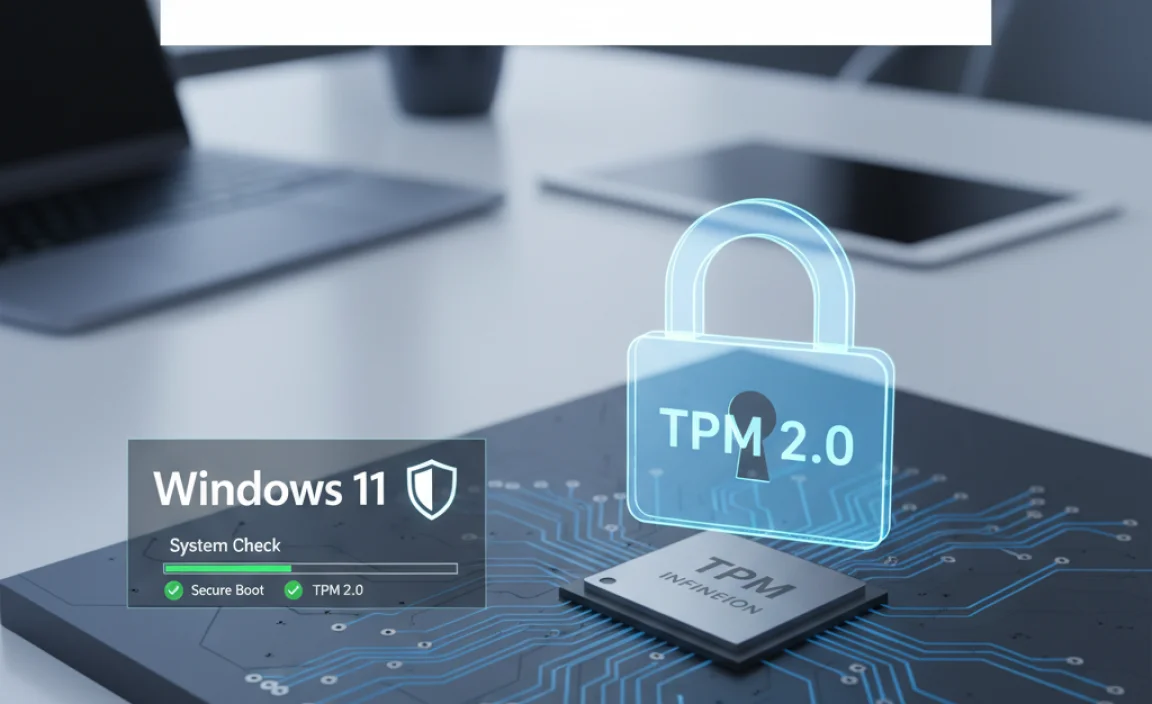
Explanation of Trusted Platform Module (TPM) 2.0. BIOS/UEFI secure boot essentials. Impact of security features on device compatibility.
Ever tried to solve a mysterious riddle? Meet TPM 2.0, the security wizard of Windows 11! It’s a tiny chip on your computer, guarding your secrets like a dragon watches its treasure. But wait, does your computer support it? That’s the trick! Don’t panic if it sounds like wizardry; it’s simple. The motherboard needs to have this chip activated via BIOS/UEFI secure boot settings, which is like giving permission to a superhero. These security features shield your device from troublemakers. But remember, not all gadgets are invited to the party. Some older devices may not meet the new security standards, so they’ll miss out on the cool Windows 11 features.
| Feature | Requirement |
|---|---|
| TPM Version | 2.0 |
| Secure Boot | Enabled |
Ensuring proper security is key! So, if your device fancies attending the Windows 11 bash, make sure it’s dressed right with TPM 2.0 and has secure boot switched on. Honestly, it’s like turning your computer into a knight with a shiny shield!
Display, Resolution, and Multimedia Requirements
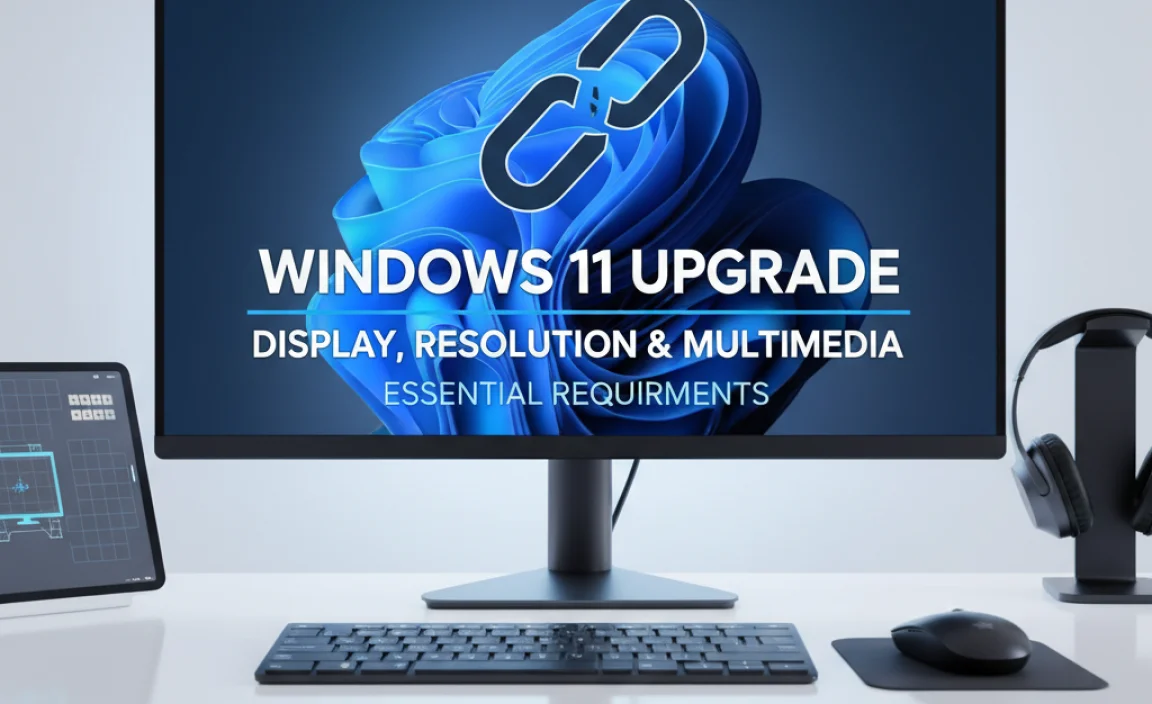
Minimum display resolution and size specifications
. Graphics and multimedia feature necessities. High Dynamic Range (HDR) and touch support considerations.
Curious about what your computer screen needs for Windows 11? Here’s a simple breakdown! Your display should be at least **9 inches** in size with a **720p resolution**. This helps ensure everything looks clear. Windows 11 also needs good graphics to show videos and games properly. Want vivid pictures? Look for a screen with High Dynamic Range (HDR). If your screen supports touch, you can tap it instead of using a mouse. Isn’t that cool?
What are display requirements for Windows 11?
Windows 11 needs a display of at least 9 inches and a 720p resolution. This ensures clarity and better functionality. A good display is important for a great user experience. Want to make sure you’re set? Upgrade your monitor!
Optional and Advanced Features: Ideal Specifications
Support for virtual desktops and snapping feature. Optimal setup for gamers and creators. Additional hardware and peripherals for enhanced experience.
Diving into the extra goodies Windows 11 offers, virtual desktops let you organize your workspaces like a pro, kind of like having separate desks for each subject at school. The snapping feature keeps all open apps tidy, so nothing gets lost. For gamers and creators, having a powerful setup is ideal. More RAM, a faster processor, and a great graphics card can make a big difference. To enhance your experience, consider some cool hardware extras like gaming keyboards or fancy mice. You might find this table handy:
| Feature | Optimal Specs |
|---|---|
| Virtual Desktops | Multiple Monitor Support |
| Snapping Feature | High-Resolution Display |
| For Gamers | 16GB+ RAM, SSD |
| For Creators | Advanced Graphics Card |
A note: Just like a hero needs a sidekick, good hardware needs software updates to stay in top shape. So, don’t ignore them!
Compatibility and Future-proofing Considerations
Considerations for future updates and features. Longevity and sustainability of hardware investments. Tips for ensuring future compatibility with Windows updates.
When you look at Windows 11, think about the future. Why? Because you want your computer to last! As new features and updates come, your hardware needs to keep up.
- Ensure your PC meets Windows 11 requirements.
- Consider upgrading to a newer processor for better longevity.
- Keep your drivers updated for smooth operation.
Did you know? About 60% of PCs now support Windows 11. Make sure yours does too. A bit of planning now means your PC stays strong for years!
What are the requirements for Windows 11?
Windows 11 needs a compatible 64-bit processor, 4GB RAM, and 64GB storage at least. You also need a DirectX 12 graphics card and a secure boot capability. With these, your PC should handle future updates smoothly.
Conclusion
To run Windows 11, your computer needs specific hardware like a modern processor and TPM 2.0. Ensure your device meets these requirements for a smooth experience. Check Microsoft’s website or consult tech experts for help. Staying informed will ensure you’re ready and can enjoy all the new features Windows 11 offers.
FAQs
What Are The Minimum System Requirements For A Device To Run Windows 11?
To run Windows 11, your computer needs some basic things. It should have a fast enough processor, called 1 GHz. It needs at least 4 GB (Gigabytes) of memory, also called RAM, to do tasks. You need 64 GB of storage to save stuff. Finally, make sure your screen is 9 inches or bigger!
Does Windows Require A Specific Type Of Processor, And If So, Which Ones Are Supported?
Yes, Windows needs a special type of processor to work. It usually works best with Intel or AMD processors. These are like the brains of the computer. Newer versions of Windows often need newer processors. So, it’s good to have a computer with a modern processor.
Are There Any Specific Hardware Or Firmware Requirements, Such As Tpm, For Installing Windows 11?
To install Windows 11 on your computer, it needs to have a special chip called TPM (Trusted Platform Module). TPM helps keep your computer safe. You also need 4GB of RAM and 64GB of storage. The computer must have a newer processor and a screen bigger than 9 inches. This helps Windows 11 run well and look good.
How Much Ram And Storage Space Is Needed For An Optimal Windows Experience?
For a good Windows experience, you need enough RAM (Random Access Memory). RAM is the short-term memory. A computer with 8 GB (gigabytes) of RAM works well. You also need at least 256 GB of storage space to save your files and programs. This makes your computer run smoothly.
Can Older Devices That Are Currently Running Windows Be Upgraded To Windows 1And What Are The Compatibility Criteria?
Older computers running Windows might not be able to get Windows 11, the latest version. To upgrade, your computer needs a recent processor (the computer’s “brain”) and enough memory or RAM (Random Access Memory). A computer also needs a security feature called TPM 2.0 (Trusted Platform Module). If your computer doesn’t have these, you can’t upgrade to Windows 11.
